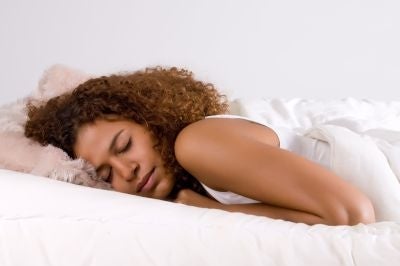Oversleeping can age the brain, researchers say

New research from the UK reveals that you can age your brain by up to seven years by getting not only too little sleep but too much.
Announced May 1 and published in the journal Sleep, the research tested memory, reasoning, and vocabulary and found that between seven and eight percent of people who slept more than six to eight hours a night scored worse on every test than those who slept less. Also, for the under-sleepers, 25 percent of women and 18 percent of men tested lower in vocabulary and reasoning capacity. The team collected data on 5,431 men and women aged 35 to 55.
"The main result to come out of our study was that adverse changes in sleep duration appear to be associated with poorer cognitive function in later-middle age," said lead author Jane Ferrie of the University College London Medical School Department of Epidemiology and Public Health in the UK in a release.
"Chronic short sleep produces hormones and chemicals in the body, which increase the risk of developing heart disease and strokes, and other conditions like high blood pressure and cholesterol, diabetes, and obesity," she added.
So, what's the sleep sweet spot? Around seven hours of good quality sleep is essential to your health and cognitive functioning, according to the scientists.
Another sleep study published last November also touts the benefits of the right amount of quality time with your pillow. The study found that people who regularly slept around eight hours a night had better memories - the ability to recall and reorganize memories and pick out emotional details - than those who do not. The research was published in Current Directions in Psychological Science, a journal of the Association for Psychological Science.
How to get a better night's rest? Health information website WebMD recommends the following:
- Cut caffeine - the effects of caffeine can take as long as eight hours to wear off.
- Avoid alcohol as a sleep aid - it may initially help you fall asleep, but it can also lead to less-than-restful sleep.
- Relax before bedtime - create a pre-sleep ritual, such as light stretching or a hot bath, to help you unwind from the day.
- Exercise - regular exercise, usually in the mornings or afternoons, can help you sleep like a baby.
- Keep your bedroom dark, quiet, and comfortable.
For more tips on restful sleep: http://www.webmd.com/sleep-disorders/guide/10-tips-to-get-better-sleep
Access the study: http://www.journalsleep.org/ViewAbstract.aspx?pid=28123
Watch: How To Sleep Well As You Get Older
http://www.howcast.com/videos/351798-How-To-Sleep-Well-As-You-Get-Older
Join our commenting forum
Join thought-provoking conversations, follow other Independent readers and see their replies
Comments
Bookmark popover
Removed from bookmarks